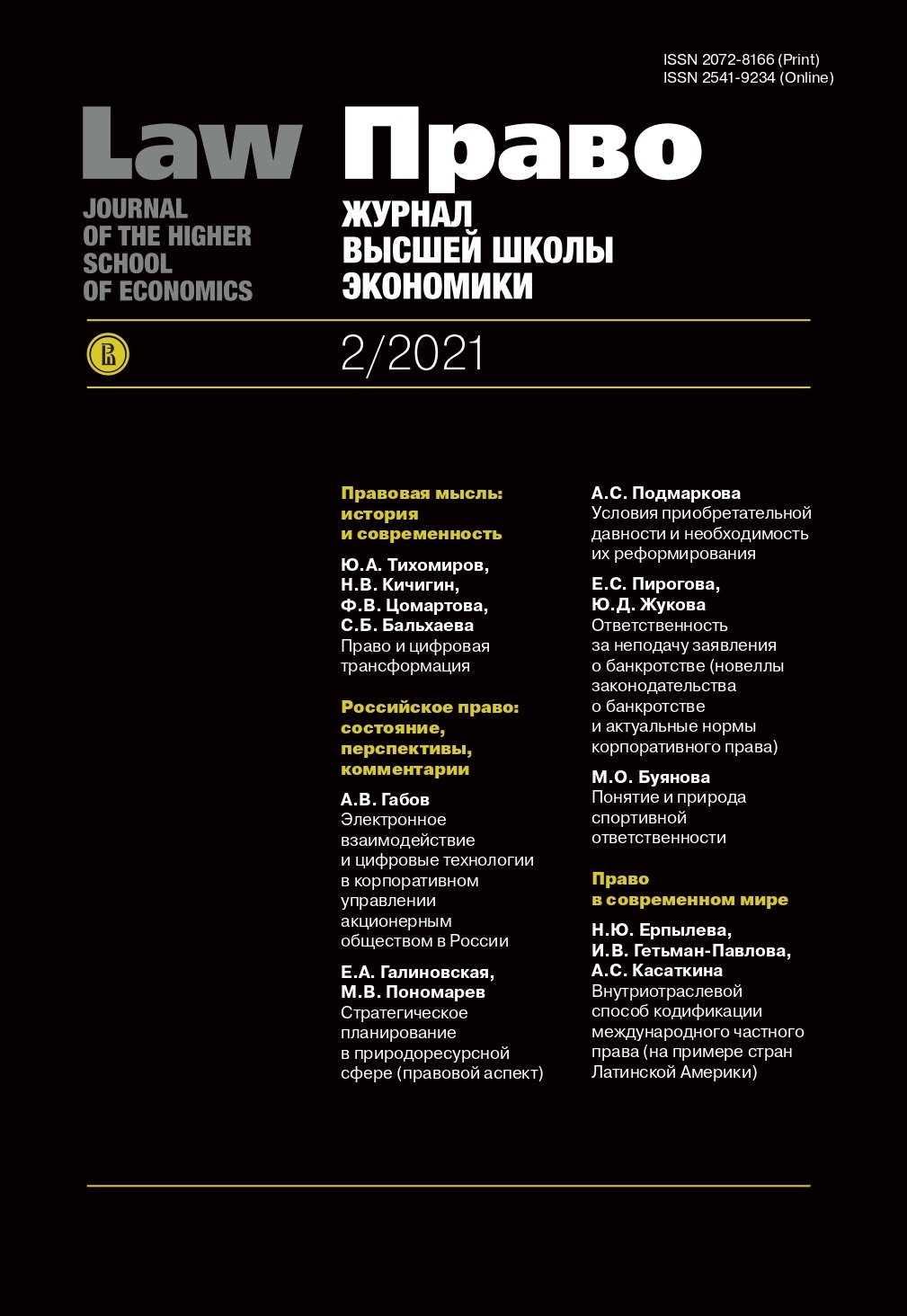Liability for Non-Filing of a Bankruptcy Petition (the Novels of Insolvency Legislation and Current Corporate Rules)
Abstract
The article is devoted to the analysis of the problems concerning the definition of the grounds of subsidiary liability of those who are responsible for initiation of the insolvency process by filing the debtor's petition. The emphasis is put on the results of the bankruptcy legislation reform of 2017: the research covers court practice over the period of last three years; gaps and controversies of the renovated legislation revealed by representatives of the legal doctrine. One of the key aspects of the research is the correlation of the novels of bankruptcy legislation with the basic current rules regulating corporate relations. The role of the director of the corporation is examined in correlation with other bodies or controlling persons who directly influence his / her decisions regarding filing the bankruptcy petition or refraining from doing this. The authors highlight the ambiguity of the situation when there are two or more chief executive officers who can potentially represent opposite positions of different shareholders within the pre-bankruptcy period. Special attention is given to the problem of non-logical correlation of powers of the chief executive officer and the general meeting of shareholders authorized to make a decision on the liquidation of the corporation. The formal absence of grounds of liability of the members of the collegial bodies of the corporation and controlling persons (such as shareholders putting pressure upon the director in order to avoid the initiation of the insolvency process at the stage of the occurance of the debtor's obligation to file the petition) seems to be a major gap in current legislation. The authors are demonstrating the necessity of spreading liability on the informed members of the board of directors and controlling persons, non-acting or acting against filing the petition. Also the research presents the analysis of the legal barriers for imposing the initial obligation to make a decision to file a bankruptcy petition on the collegial body of the corporation, such as uncertainity of the scope of persons liable for non-using the right to request to convene an extraordinary meeting of shareholders; ignorance of the role of the board of directors in the corporation; lack of attention to differences in the scope of powers of the general director in a joint-stock company and a limited liability company; impossibility to demand to vote for liquidation; unreasonably shirt terms of convening an extraordinary meeting under the new rules of Bankruptcy Act. The authors are proving that the scope of liable persons should depend on the type of the corporation. The conclusions concerning the limits of shareholders' liability are suggested as well.
References
Dolinskaya V.V. (2018) Conceptual issues in insolvency law: reflections on chapter III.2 of Federal law “On insolvency (bankruptcy)”. Zakony Rossii: opyt, analiz, praktika, no 7, pp. 9-15 (in Russian)
Egorov A.V., Usacheva K.A. (2013) Subsidiary liability for bankruptcy as a wrong equivalent of the Western doctrine of removal of corporate veil. Vestnik VAS, no 12, pp. 6-61 (in Russian)
Gabov A.V., Gutnikov O.V., Doronina N.G. et al. (2015) Legal entities in Russian civil law. Vol. 1. Moscow: INFRA-M, 384 p. (in Russian)
Gorbashev I.V. (2018) Subsidiary liability in the explanations of the Supreme Court of the Russian Federation. Vestnik grazhdanskogo prava, no 4, pp. 154-202 (in Russian)
Gutnikov O.V. (2019) Corporate liability in civil law. Moscow: Kontrakt, 488 p. (in Russian)
Gutnikov O.V. (2018) Liability of head of debtor and other persons in a bankruptcy case: novelties and deficiencies of the law. Predprinimatelskoe pravo, no 1, pp. 48-60 (in Russian)
Kolzdorf M.A., Shmagin A.A. (2018) Content and implementation of the “four-eyes” principle in Germany. Vestnik grazhdanskogo prava, no 6, pp. 220-238 (in Russian)
Lomakin D.V. (2008) Corporate relationships: theory and implementation in corporations. Moscow: Statut, 509 p. (in Russian)
Orlenko V. (2018) Bringing managers and other supervisors to subsidiary liability in bankruptcy proceedings (recent legislative changes and their application). Trudovoe pravo, no 4, pp. 5-24 (in Russian)
Osipenko O.V. (2018) Systemic application of corporate governance and equity law instruments. Moscow: Statut, 448 p. (in Russian)
Rykov I.Y. (2019) Subsidiary liability: trends of contemporary management. Moscow: Statut, 195 p. (in Russian)
Sannikova L.V. (ed.) (2015) Civil Code of the Russian Federation: commentary to chapters 1-5. Moscow: Statut, 662 p. (in Russian)
Shitkina I.S. et al. (2019) Corporate law. Moscow: Statut, 735 p. (in Russian)
Sukhanov E.A. et al. (2011) Russian civil law. Vol. 1. Moscow: Statut, 958 p. (in Russian)
Tsepov G.V. (2016) Is it possible to judge greed? Liability of controlling persons of a commercial corporation before creditors for taking an excessive business risk in the event of insolvency. Zakon, no 8, pp. 98-120 (in Russian)
Copyright (c) 2021 Law Journal of the Higher School of Economics

This work is licensed under a Creative Commons Attribution-ShareAlike 4.0 International License.


















